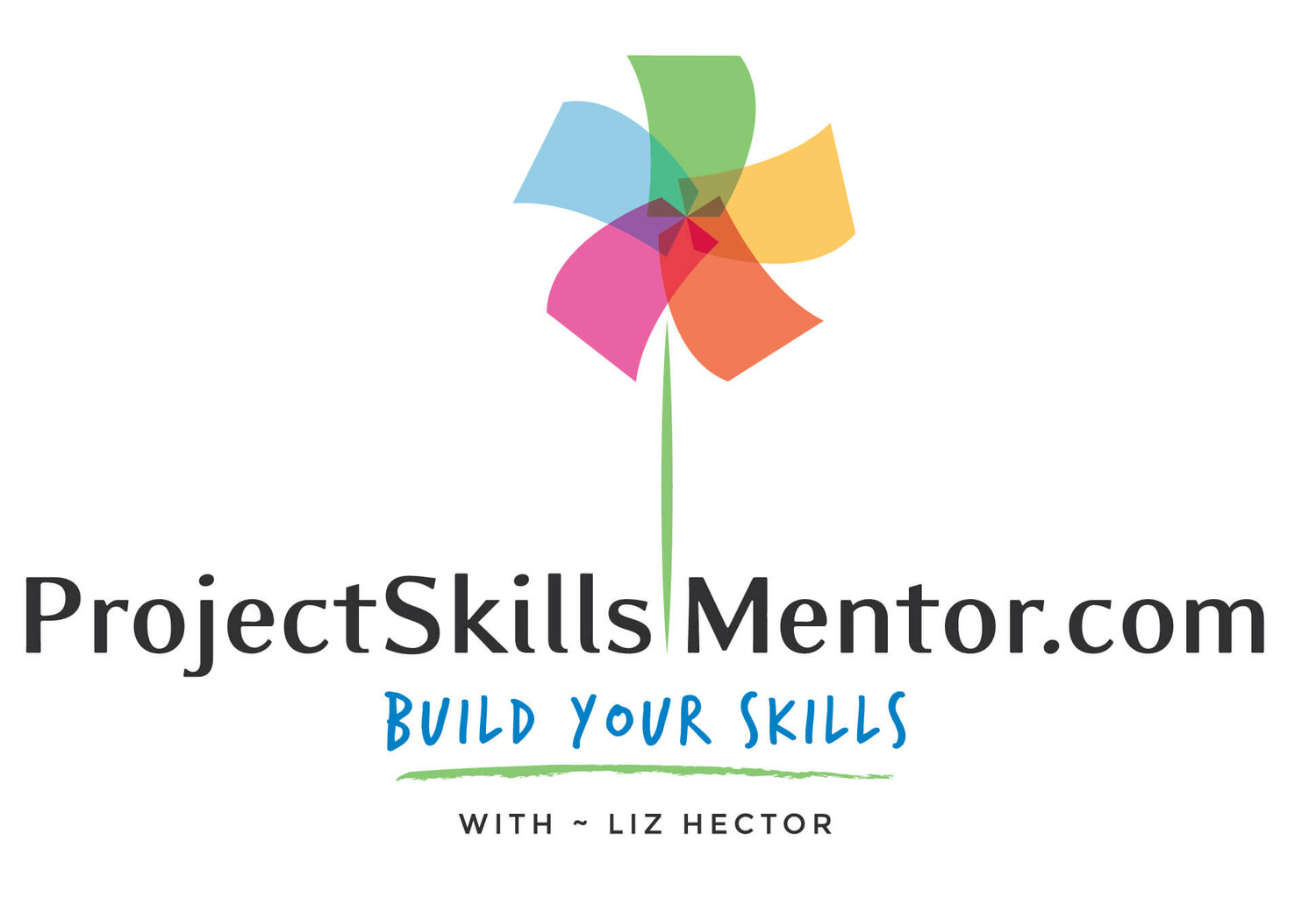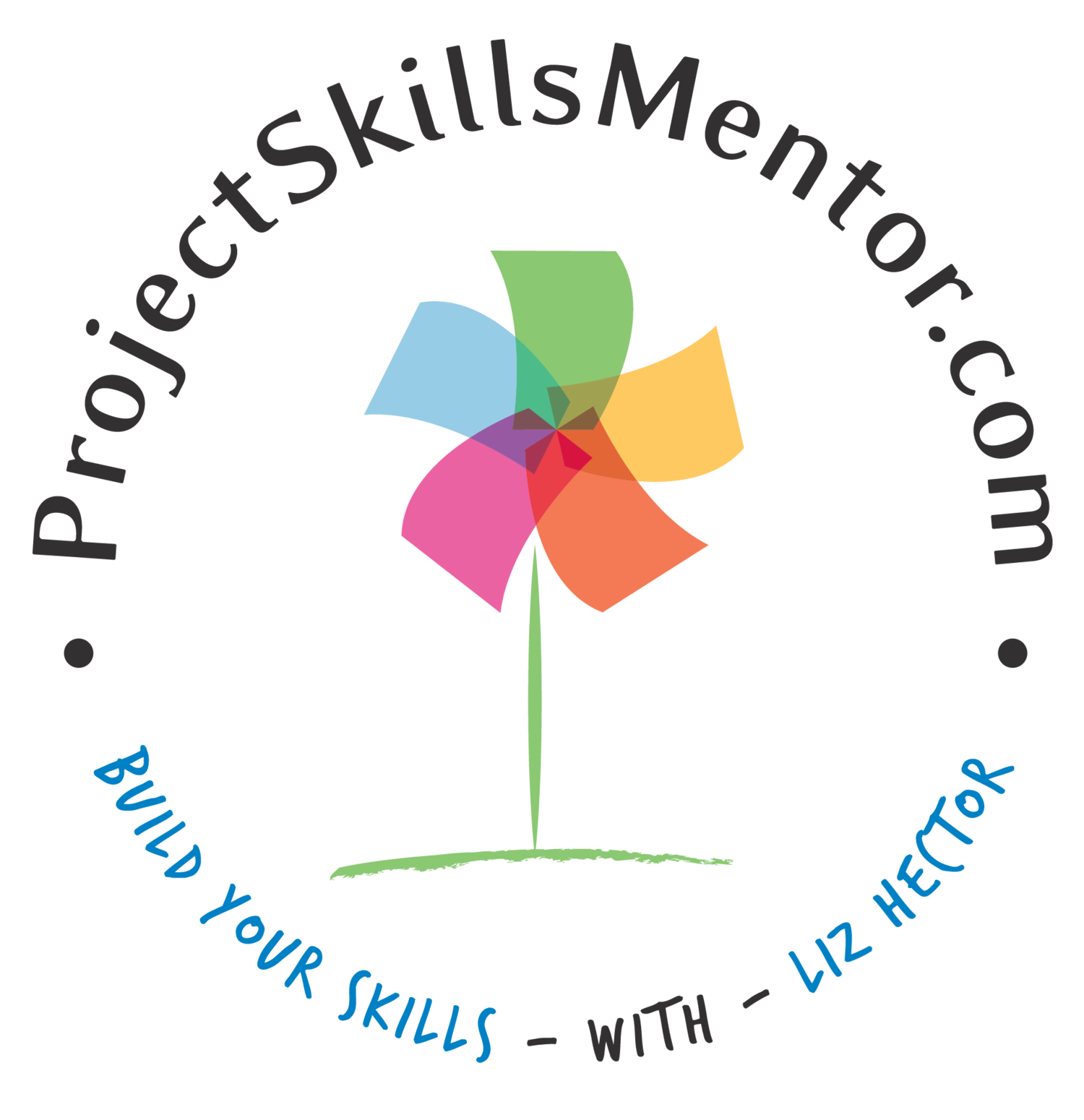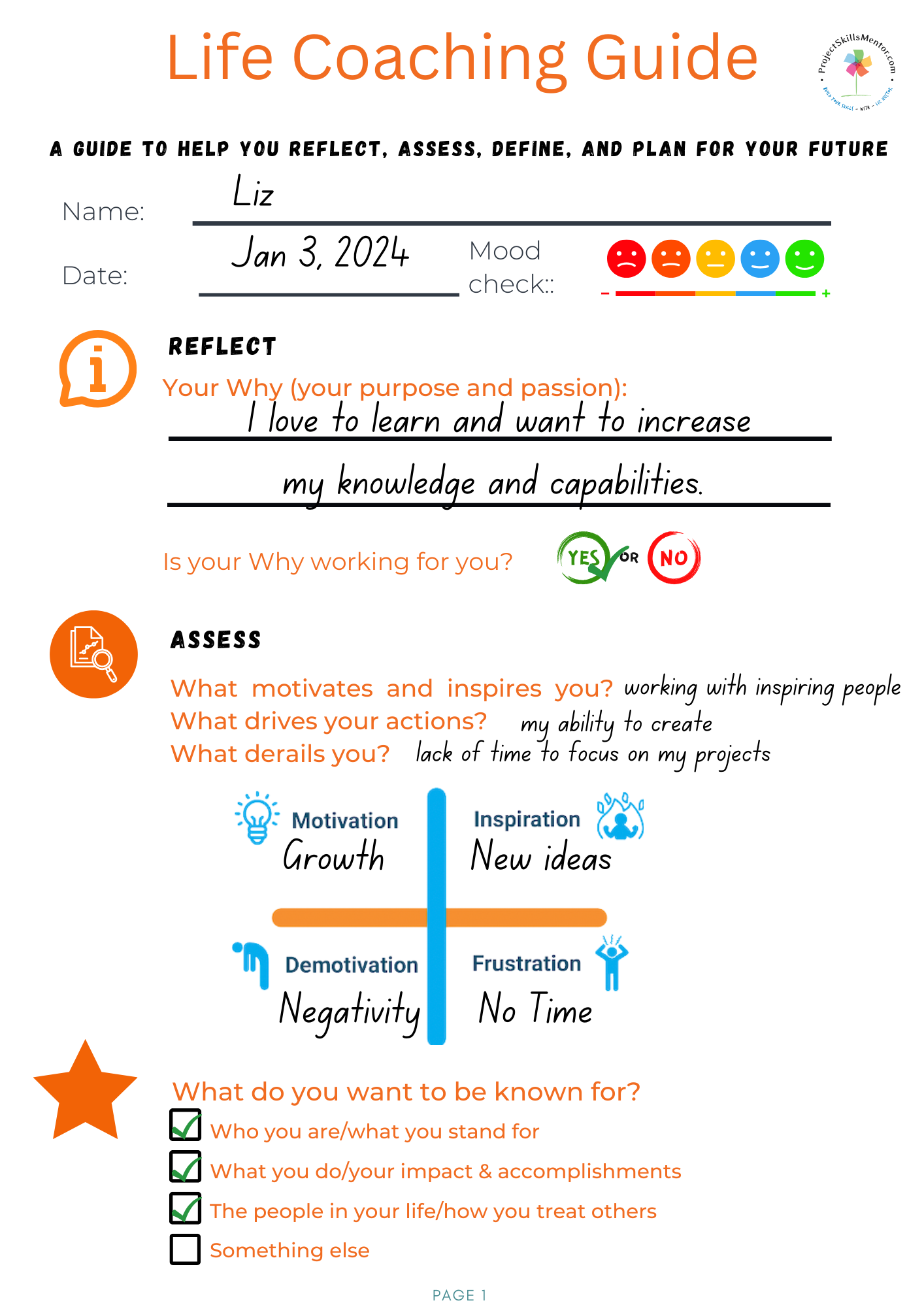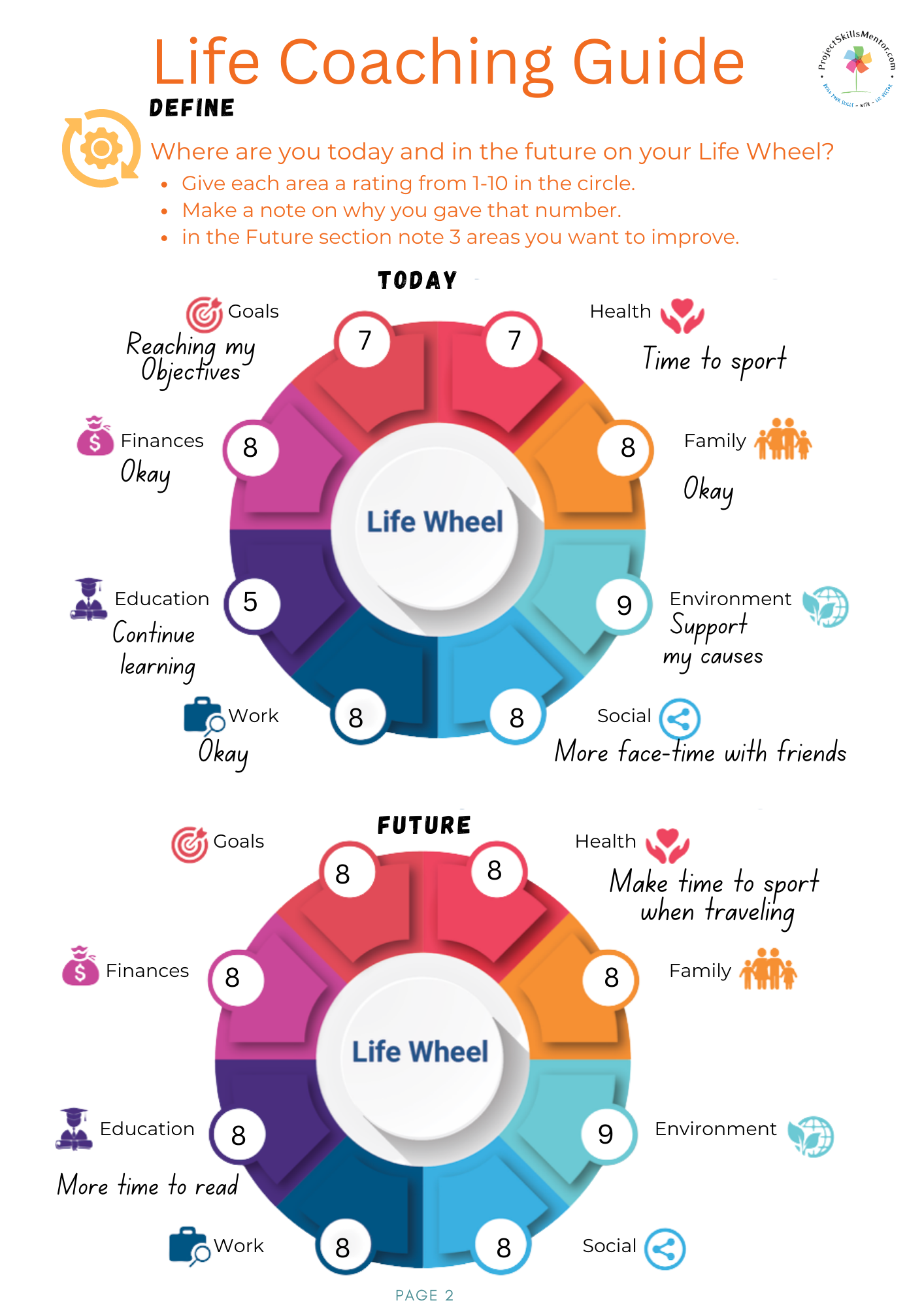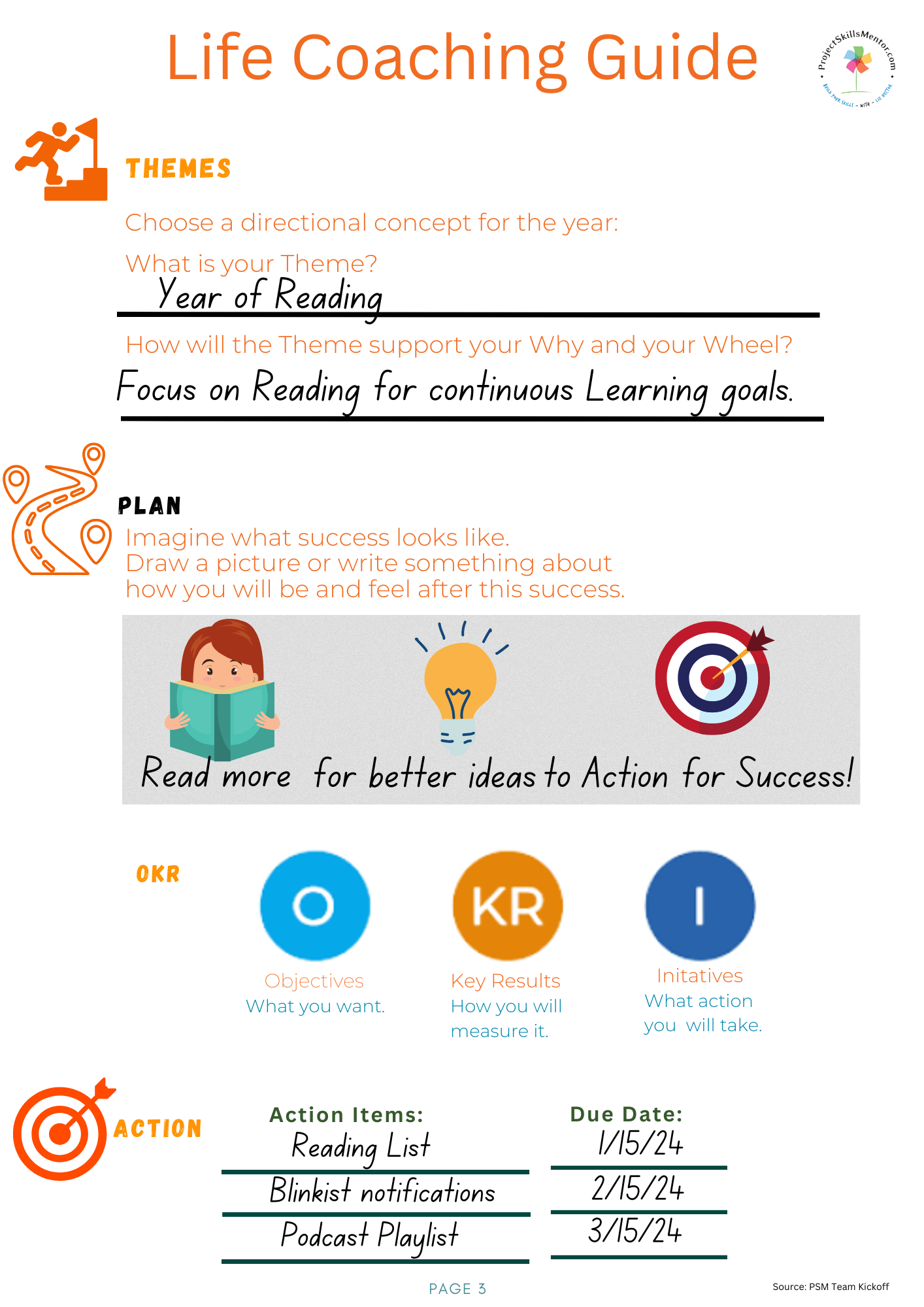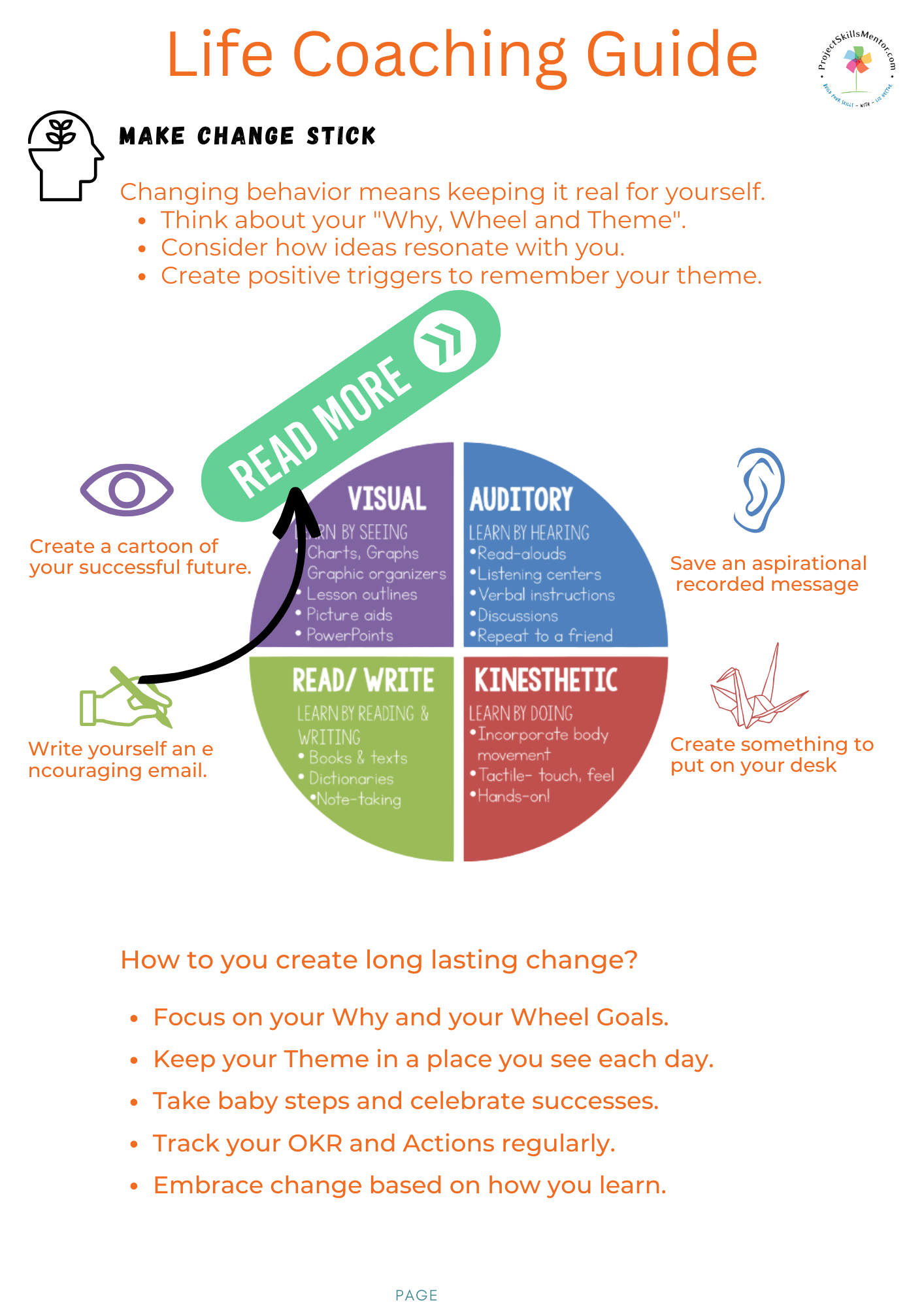Goal Setting | How to set and achieve your objectives
January doesn't represent just a New Year. It represents a possible new you. New beginnings are moments when you can start with a "blank slate." They are fresh starts. And don't we all need a 'do over' from time to time? Special dates can allow us to review where we are and plan a better future. Dates like -
New Year
Changing seasons
Starting a new school year
Any sort of anniversary
Allow yourself time to reflect, assess, and plan a future roadmap now to be more successful in the future.
5 steps to creating a plan for your future
Reflect
Assess
Define
Plan
Track
Are you ready to change? Yes? Great! Get started with the first step: Download the coaching guide here. And follow along to see how to use this Guide.
A New Start - Starts Now
Get Started with the Life Coaching Guide
If you have downloaded the Guide, start at the top of Page 1. Dating your document will help you track your views on the new you—plan to do this process at the start and end of your time frame. Keep these documents each year to track progress and get a sense of the changes of your life goals over time.
Check your mood
It's important to understand how you feel when you complete this process. Are you feeling Hopeful, energetic, or optimistic? Depressed, sad, or discouraged?
Knowing how you feel now will help you when reviewing your Life Coaching Guide later. Depending on your state of mind, you will have different results, so be aware and give yourself grace. Feeling down? Go ahead and start. Complete the Guide, but do another when you are feeling more upbeat. It can be helpful to compare your two versions to keep track of your feelings. Use the process to build hope for your future and help you to find a balanced and pragmatic path forward.
If you read my 2022 Life Coaching plan, you will notice that I have made several updates to this year’s version to include more steps to address the ‘blockers’ to sustainable success.
Reflect on your "Why"
What is you're “Why”. What is your purpose and your passion in life? Chance, are you already know it. But, if not, ask yourself.
What gets you up in the morning?
What makes you happiest what makes you most fulfilled?
What makes you proud and feel productive?
Take time to consider this point, as it is important for the next step.
Note that your "Why" can have a few traps.
Gaging your "Why" by how you spend your time may be misleading. (TV, social media, and other things may not be your joy, but they do steal your valuable time)
Consider if your "Why" is actually someone else's. It should be yours (not your bosses, spouses, or kids).
Defining your 'Why' may be overwhelming you. Start with the smallest single value for yourself that you can define.
Assess Your Situation
Now let's move into the assessment phase. Understanding what motivates you is important. Your goal is to look for situations that add to your energy and minimize those that take away your mojo.
Also, think about what you want to be known for.
What do you want to be proud of at the end of 2023?
If you heard to coworkers chatting and one mentioned you, what would you like them to say?
Be aware of your value and make sure you are around people to respect and value you accordingly.
Define the New You for the New Year
Evaluate the areas of your life
Be honest. Most of us don't think about how we are doing in our lives. But digging into these areas can lead to a better understanding of where you are now and where you want to be in the future.
By really assessing each area over the course of the past year and rating yourself, you get to see the gaps you want to prioritize.
This is not about judgment, it's to help you create the future you want.
The Life Wheel represents the various areas of your life. Feel free to modify the areas to reflect your situation better.
The Today Wheel represents now.
Rate each area on a scale of 1 to 10.
Put your evaluation in the circle next to each area.
Make notes or comments for reference later.
Once your Current Wheel is complete and reviewed, move on to the Future Wheel. This is your aspirational plan for the future.
Again, Rate each area on a scale of 1 to 10 for the future.
Note your aspirational objective in the circle next to each area.
Make notes for reference later.
Choose 1-3 areas to focus on in the coming period. You don't want to make big leaps - start small. A goal of moving an area from a 6 to a 7 or 8 is enough. Focus on a few good but manageable objectives.
Your" Why" and your Future "Wheel" will be part of the next steps of your plan.
Next, Choose a Theme for the Year to create a roadmap for your future.
Define your Theme
A yearly Theme is about setting yourself an overall idea of how you want to approach each year. Your Theme becomes a guide for you. Whatever it might be for you, your personal or professional life.
Mike Hurley, Cortex Podcast
An Example:
Instead of saying, "I want to read 20 books this year." Make your theme "The Year of Reading" This allows you to be curious about different kinds of reading: papers, news, and books. Allowing you to widen the definition of success. The Theme guides you through reading more, not just hitting a specific number. This will lead to broader and more reachable success rather than an absolute win/lose scenario.
Look for words that resonate with you as you think about your Theme. What is the Minimum Possible Success that would meet your goals? What is your aspirational view of success?
CPG Gray, Cortex Podcast and Themes Video Vlogger
Themes create a clear way forward by broadening focus on your future state. Themes nudge you in the direction you want to go, even when information is incomplete and the future is unknowable. Having a Theme helps you to take control of your choices. Since your Theme is informed by your Why purpose and Wheel areas to address. Your Theme can be a beacon to help keep you on course through the year. With this focus, you will be able to change your behavior and model the success you want to embrace.
But, as we all know, it is really hard to change yourself. To help you meet your life objectives, we need structure and execution planning to the use of your Theme. Let's look at how you can add structure to the process.
How to Plan for Success
Start your planning by imagining your success once your Theme is realized. Make a picture or statement to embody this successful outcome. The idea is to make it simple, short, and real for you.
Build your Action Plan
Define your Theme based on you Why and your Future Wheel.
Then create a plan by imagining what you need to do to make realize your goal. Use the OKR evaluation to consider how you turn objectives into initiatives to act on.
Build a plan of action you can do and then do it. Track how you are doing over time to ensure you reach your goals - remember, the goal is to do better. Success is not a number. It is forward movement toward a more fulfilled you.
Build your OKR with an Action Plan
OKR can help you define the actions behind the idea. You can map this as a mind map, high level project plan (for an example watch this 1 minute video), or a list of 2 or 3 concise, time-based actions.
An Example:
If your Theme is "The Year of Reading," make a list of the books, news sites, or other content you want to receive notifications to read. Make time in your calendar to read. And make a note of the days you were successful. This can be as simple as a checkmark next to a calendar setting on repeat.
Your Theme gives your purpose direction, but your OKR gives you specific tasks to help you accomplish your goal.
To test if your direction is specific enough. Ask yourself:
Do my Initiatives align with my Why, Wheel, and Theme?
Are these actions part of what I want to be known for?
Is this how I want to use my time?
Will this provide the outcomes for my life Wheel aspirations?
Will I have met my core needs related to my Why and my values and purpose?
With your Actions in place, make sure you give yourself due dates. Don't wait until the end of the year to make milestones toward your goals. Look for things you can start regularly doing to embed the new behavior into your daily routine. Actions may include things to start or things to stop.
An Example:
Your action to read may include. Turn off the TV at 10 every night (Stop action) and read for 30 minutes before bed (Start action)
Make the Changes Stick
Learn how you learn
Change is hard, so knowing how you process information is important. Learning and change can be specific to the topic and context. Consider what resonates with you, try it, and then assess if it works. If not, try something else. Journaling your change progress and successes can help you learn over time to improve outcomes and the change process.
If you can, ask others for feedback to ensure your success is also working for others around you.
Remember to continue to reinforce the behaviors you want and reset behaviors you want to avoid. Take small steps each day, week, or month to realize your end state.
Visualizing your Theme objective can create a daily reminder. One tip is to use your natural way of learning and retaining information to retrain your brain.
Want to keep your focus on your Theme and Objective? Try creating something you can see or listen to regularly. This will reinvigorate your energy to accomplish your goal. It can be your Theme in writing or something that gives you a sense of success. Some Ideas are:
A picture or your drawing of success
Watch content that helps you toward your goals (such as Financial Habits to Adopt in 2023)
Send yourself an encouraging message or song you like (or create)
Write a letter or message from your future self to congratulate you on your success and the decisions made to reach your goal.
Make or buy a visual reminder of your goals. It can be abstract if it reminds you of what you are working towards.
The process of change is learned. And it is proven that just thinking about how you think improves your outcomes.
For instance, having your students describe which study strategies and conditions for their last exam worked for them and which didn't is likely to improve their studying on the next exam
Nancy Chick - Center for Teaching, Vanderbilt University
It's my Life; it's now or never, as the song goes. So make the most of it and make it one that is full of purpose, passion, and intention.
